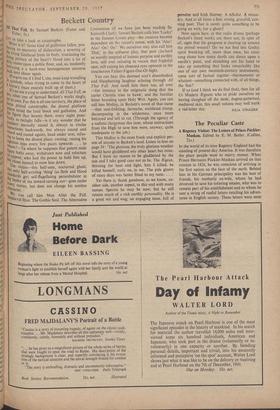Country Beckett
T US take a look at catastrophe. What is it? Some kind of guillotine fallen, pro- ducing an enormity of dislocation, a severing of the living Godhead from its body, translating the ,'."ng privacy of the heart's blood into a lot of dirty stains upon a public floor, and, so, insolently betraying a a hard-won homogeneous universe back into g
chaos again.
i (Forgive me if I find I, too, must keep travelling :1 "Ws, when trying to come to the heart of literary maze entirely built up of them.) , 11's no use trying to understand All That Fall, or any other one of Samuel Beckett's works singly, s„n its own. For this is all one territory, the place of vine primal catastrophe, the dismal platform rwhere stood the fatal block and guillotine. And the figure that haunts there, every night punc- allY twilight falls—is it any wonder that he 74oders eternally round it, always in circles irsometimes backwards, but always round and ihl °Lind and round again), head under arm, refus- to leave the dismal place; cursing; raising his sightless eyes every few paces upwards . . . to h°"1?--To where he supposes that potent male pure lurks away, withdrawn now and reluctant i appear, who had the power to hold him up, in chose instead to mow him down. thYhe victim—this half-seen, nocturnal ghost, stis Only half-existing 'thing' (as flesh and blood v_andards go), self-flagellating perambulator in Ile limbo of the inward-turning eye—goes under L4nY names, but does not change his sombre cliaracter. m.\\`:e can call him Man After the Fall. uneval Man. The Gothic Soul. The Alternative Convention (if we have just been reading Sir Kenneth Clark). Samuel Beckett calls him 'Lucky' in the famous Godot play—the creature become dependent on the tyrant's noose, with his 'Alas! Alas! On! On !' We ourselves may also call him 'Didi,' in the selfsame play, that poet clochard so weirdly emptied of human purpose and earthly love, still ever refusing to vacate that- frightful spot, still raising his obsessed eyes upwards to the treacherous Father-Figure-Out-Of-Sight.
You can hear this damned soul's disembodied and blaspheming laughter echoing through All That Fall. And smell him there too, all over —for instance in the enigmatic dung that the carter Christie tries to hawk; and the familiar bitter brooding upon Holy Writ. Again, you can call him Molloy, in Beckett's novel of that name —that soul-freezing, farouche, mutilated .tramp, decomposing in the wilderness, once more betrayed and left to rot. (Through the agency of a sadistic clergyman this time, whose instructions from On High to save him were, anyway, quite inadequate to the job.)
This Molloy is the most frank and explicit per- son of anyone in Beckett's land. Listen to him on page 39 : 'The glorious, the truly glorious weather would have gladdened any other heart but mine. But I have no reason to be gladdened by the sun and I take good care not to be. The /Egean, thirsting for heat and light, him I killed, he killed himself, early on, in me. The pale gloom of rainy days was better fitted to my taste. . .
Yet there is, thank goodness, as we know, an- other side, another aspect, to this soul with many names. Spectre he may be now, but he still retains much of a rich earthly personality. He is a great wit and wag; an engaging tease, full of paradox and Irish blarney. A scholar. A vision- ary. And at all times a fine, strong, graceful, cun- ning poet. That is surely qi.fite something to be going on with, for a ghost
Now again here, in thin; radio drama (perhaps Beckett's finest work), are there not, in spite of -all, signs that the gangrene is clearing up around the primal wound? Do we not find this Gothic spirit breaking off, more than once, his runic song about how many devils can dance upon a needle's point, and stretching out his hand to take up something that looks remarkably like one of our own twentieth-century instruments, some sort of factual register—thermometer or whatnot—something connected with, of all things, the Sun?
If so (and I think we do find that), then for all Us Modern IEgeans who so pride ourselves on having sloughed off the dank, dogma-patterned, medimval skin, this small volume may well mark






























 Previous page
Previous page